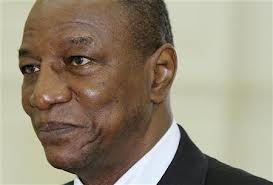
Dear Friends and Colleagues:
George thought you might be interested in the op-ed below published today by Guinean President Alpha Condé. President Condé writes about the struggle to reform business practices in Guinea’s mining sector so all the people of Guinea can benefit from the country’s immense mineral wealth. The op-ed comes in the context of Conde’s participation in this year’s G8 meeting, which is focusing on trade, taxes, and transparency. OSF has been in the forefront of promoting transparency particularly in the governance of natural resources. President Condé is emerging as a champion of these values in Africa. His op-ed is an elegant statement of why the issue is so vital to the continent’s development.
Best regards,
Michael Vachon

In Guinea we want our resource wealth to work for all the people.
We need G8 support for transparency and good global business governance so that our assets can be used to benefit everyone rather than just a few greedy mining companies and politicians.
In December 2010, I was elected president of Guinea in its first truly open and democratic elections. I said then that I had inherited a country, not a state. Our economy was in ruins, our people among the poorest on the planet and our political system weakened by decades of corruption, dictatorship and misrule.
It needn't be so. Guinea has vast mineral wealth, the world's largest reserves of bauxite and some of the highest grade iron ore deposits.
Making these assets work for all our people rather than a few unscrupulous international mining companies and politicians means confronting the deeply ingrained corruption in our politics and business. But uprooting such corruption can be painfully slow, and is often dangerous. After all, vested interests do not welcome challenge.
Compared to developed countries, rogue actors do disproportionate damage in a country like Guinea, more so than they do in developed nations. Lack of transparency and endemic economic corruption do not mean only unpaid taxes and lack of competition; they also corrode the political process and undermine our evolving democracy. It impedes change and opens the door to frustration and the kind of political tension and regrettable violence – including tragic deaths – that have recently affected our country.
That is why, on Saturday, I will join British prime minister David Cameron at the G8's trade, transparency and taxation conference. Guinea's current agenda mirrors that of the G8. We both want to work with companies that play by the rules, operate in a transparent way, and pay their taxes.
But there can be no future in the questionable – and often criminal – deals of the past. Our population is young – 70% are under 25. They are eager for change and have no interest in perpetuating the old corruption culture. Their future is our hope and our responsibility.
That future will be built on healthy partnerships between government and the private sector, a commitment to strengthening democracy and transparency, and a focus on using our resource wealth to achieve higher living standards for our people.
We have already made much progress. Guinea has signed up to the Extractive Industries Transparency Initiative, along with the UK, France, Australia, Norway and the US. We are developing new, equal and long-term partnerships with responsible global mining companies, providing long-term commitment to creating jobs and sustainable, long-term benefits for both sides.
We have also insisted on reviewing the legality of mining contracts signed by Guinea's previous undemocratic and military regimes, and we have published all contracts online for the world to see.
What we need now is the support of developed countries in building a global business climate that permits those who play by the rules to prosper and locks out those who do not. Too many of the world's finance centres enable the predators who rely on offshore corporate vehicles to mask their identities; loop their finances through offshore jurisdictions; and use prestigious law firms, accountants, financial advisers and public relations firms to give their destructive behaviour a false veneer of respectability.
This has created a greenhouse in which corruption grows and flourishes, posing a mortal threat to Africa. Guinea will work closely with the FBI, with Britain's Serious Fraud Office, and other law enforcement agencies to expose and root out criminality that threatens the integrity of global markets and African democracy alike.
Guinea appreciates the aid we receive. I hope donors understand when I say that, while we currently need their assistance, we do not want it. We see our anti-corruption agenda as being simultaneously pro-business and pro-development. We do not want to live dependent on the generosity of others when our resources can make us prosperous, healthy and strong.
When I meet Cameron I will not ask him for British taxpayers' money, I will ask instead for him to continue showing leadership on transparency and good global business governance. Transparency and good governance promise to benefit not just countries like Guinea, but Britain and the world as well.
• Alpha Condé is president of Guinea
See Also:
Open Source Everything – List and Book



